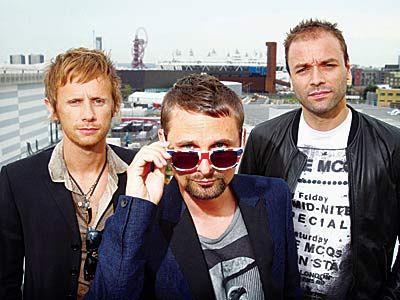|
|
神曲不给力:伦敦奥运会主题曲被打入冷宫 缪斯乐队 缪斯乐队If an Olympic-themed song is supposed to inspire competitors to new athletic heights, Survival, the official Olympics song from British rock band Muse, is hardly a good example。 如果说奥运主题曲的作用本应是激励赛手勇攀体育高峰的话,那么由英国摇滚乐队缪斯带来的这首《Survival》并不能以身作则。 Charting in the UK at No 25, the song is way outside the medal position. It invites the question: does anyone really care about Olympic songs? 从全英单曲排行榜第25名的成绩看来,《Survival》似乎要与前三甲无缘了。这也引发了新一轮的思考:真的有人会喜欢奥运歌曲吗? If you need a group to capture the excitement of the world’s biggest sporting event, Muse would seem to be the perfect band to pen a great Olympic anthem。 如果你需要一个团体来捕捉这项全球顶级体育盛事的激动时刻,缪斯乐队似乎是创作非比寻常的奥运会会歌的不二人选。 But Survival lacks drama. During its five-plus minutes, we *encounter an *orchestra, guitar work, a piano *riff, lead singer Matt Bellamy’s *wailing *falsetto, and *cheesy lyrics。 但是《Survival》缺乏戏剧张力。在5分多钟的歌曲中,我们会听到管弦乐、吉他弹奏、钢琴演奏的连复段,主唱马特?贝拉米的哀嚎假声以及俗不可耐的歌词。 “It’s a race, and I’m gonna win,” he sings–overblown and pretentious。 “这是场比赛,我一定会赢得胜利,”他如此唱道,夸张且做作。 Muse is not alone in writing a less-than-inspiring Olympic song. Christopher Cross’ A Chance for Heaven, the official track of the 1984 Los Angeles Olympics, was far from a personal best; Celine Dion’s The Power of the Dream, performed at Atlanta in 1996, was nothing surprising。 说到火候欠佳的奥运励志歌曲,并不单单只有缪斯乐队的大作。由克里斯多夫·克罗斯为1984年洛杉矶奥运会的创作的官方曲目《A Chance for Heaven》,也远远没有达到他本人的最佳水准。而席琳·迪翁在1996年亚特兰大奥运会上演唱的《The Power of the Dream》也是平淡无奇。 So why do these songs keep getting made? There’s a certain amount of *one-upmanship at play。 那么,为何此类歌曲还是源源不断地被创作出来呢?在赛场上它们确有过人之处。 No one wants to be the country without an Olympic anthem. Pop music is also part of the British national identity。 所有人都希望自己的国家能拥有一支奥运主题曲。同时,流行乐也是英国国家形象的一部分。 If any nation is entitled to write an Olympic song, surely it’s the one that brought the world The Beatles and Queen。 如果说有哪个国家最有资格来创作奥运歌曲,那么这个曾诞生了世界皇后乐队以及甲壳虫乐队的国度可谓当之无愧。 However, unlike a soccer tournament, the Olympics are a weeks-long *frenzy of sports and competition of national interests。 然而,不同于足球比赛,奥运会是一个为时数周的狂热赛事,同时也是各国利益的相互较量。 The opening and closing ceremonies can barely sum up the event–how could one pop song hope to do the same? 就连奥运会的开闭幕式都几乎无法总结这项盛事,更何况是一首流行歌曲? “You can’t capture a nation’s mood with an Olympic song because there isn’t the same *fanaticism for the event as there is for, say, the national soccer team,” John Aizlewood, who writes for Q magazine, told The Atlantic。 “你不可能通过一首奥运歌曲就能打动全国人民的心,举例来说,人们对于人们对于奥运会的狂热与对国家足球队的狂热截然不同。”《Q》杂志的撰稿人John Aizlewood在接受《大西洋月刊》采访时这样描述道。 Perhaps that’s why, in the US at least, the only Olympic tunes to ever stick around have been wordless, modern-classical works of *pomp and circumstance: John Williams’ Olympic Fanfare and Theme–recorded for the 1984 games in Los Angeles–and Leo Arnaud’s Bugler’s Dream, which ABC played before its 1964 Olympic broadcasts。 也许这就是为何,至少在美国范围内,为人们所传颂的奥运旋律是没有歌词、气势恢宏的现代古典主义作品:例如约翰·威廉姆斯为1984年洛杉矶奥运会录制的《Olympic Fanfare and Theme》(奥林匹克号角),以及里昂·阿尔诺的《Bugler’s Dream》, 美国广播公司曾在转播1964年奥运会比赛前播放过。 Muse *makes a stab for orchestral *grandeur with an extended string-section *prelude, but then Bellamy’s wailing kicks in, and we’re *jolted back to radio territory。 缪斯乐队运用了一段延时的管弦乐前奏,由此尝试了把气势恢宏的交响乐,但稍后贝拉米一开嗓,就将我们拽回到音乐广播的水平上。 If Olympic singalong songs are *doomed from the start, no one seems to have told the 2012 organizers。 如果奥运会的主题曲从一开始就注定失败,那么2012伦敦奥运会组织方肯定没有被告知这一点。 Elton John, Mark Ronson and The Chemical Brothers have all been signed up to release Olympic singles。 埃尔顿·约翰,马克·朗森,和化学兄弟纷纷签约发行奥运单曲。 Will they be able to capture the public’s imagination in a way that Survival has failed? The track record would suggest otherwise。 那么他们能否从《Survival》的失败中汲取教训,成功激发公众的想象力呢?以往的表现可以从另一个侧面暗示一二。 网友评论
|
||||||||||||||||



